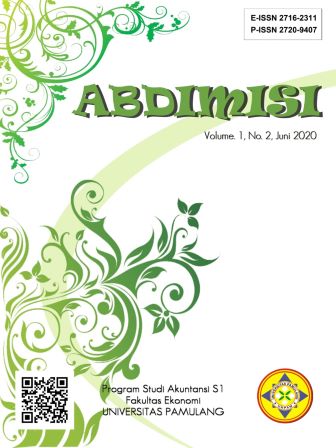PELATIHAN AKUNTANSI PADA PENGELOLAAN BANK SAMPAH “MENGUBAH SAMPAH MENJADI RUPIAHâ€
DOI:
https://doi.org/10.32493/abms.v1i2.3857Abstract
Community service with the title Accounting Training in Management of Garbage Banks "Turning Trash Into Rupiah" aims to assist the management of Waste Bank in managing the records of the Garbage Bank and help resolve the problems of bookkeeping of the waste bank as faced today, including reports on purchases to customers of the waste bank , reports on sales to collectors, reports on the results of sales of garbage banks, reports on revenue and expenditure of funds and makes simple financial statements of waste banks as a responsibility of the management of the waste bank to the community. PKM involves lecturers and resource persons Lecturers in the S1 Accounting Study Program from Pamulang University. The results of the implementation of the PKM conducted on November 6, 2019 were adding knowledge in the field of accounting, especially regarding the financial recording of the participants of the Babakan Waste Management Group of Babakan Village, South Tangerang. The response of the participants was very good and happy because it was very helpful in learning about financial records. Suggestions submitted were PKM activities in the future to be carried out continuously so that the participants would always get guidance in accounting records and provide financial reporting to the public related to the Waste Bank, so that the community was more enthusiastic in collecting waste because it could provide high economic value.
Keywords: Accounting Training, Trash Bank
References
Anonim. (2011). Manajemen Pengolahan Sampah. Diakses pukul 12.30 WIB/ 07/ oktober/2019 oleh: http://cleanandnature.blogspot.com/
https://www.academia.edu/16712053/MAKALAH_BANK_SAMPAH_untuk_MENGHASILKAN_UANG
Juju, Bandung. (2012). Bank Sampah Cara Pengelolaan Sampah yang Berprospek Ekonomi.
Peraturan Menteri Negara Lingkungan Hidup Nomor 13 Tahun 2012 Tentang Pedoman Pelaksanaan Reduce, Reuse dan Recycle.
Peraturan Pemerintah Nomor 81 Tahun 2012 tentang Pengelolaan Sampah Rumah Tangga dan Sampah Sejenis Sampah Rumah Tangga.
Prastiyanto, Alfian Dimas. (2017). “Partisipasi Masyarakat Dalam Pengelolaan Bank Sampah Gemah Ripah Di Dusun Badegan Desa Bantul Kecamatan Bantul Yogyakartaâ€. Skripsi, Yogyakarta : Fakultas Ilmu Pendidikan Universitas Negeri Yogyakarta
Downloads
Published
Issue
Section
License
Copyright Notice
Authors who publish with this journal agree to the following terms:
- Authors retain copyright and grant the journal right of first publication with the work simultaneously licensed under a Creative Commons Attribution License that allows others to share the work with an acknowledgement of the work's authorship and initial publication in this journal.
- Authors are able to enter into separate, additional contractual arrangements for the non-exclusive distribution of the journal's published version of the work (e.g., post it to an institutional repository or publish it in a book), with an acknowledgement of its initial publication in this journal.
- Authors are permitted and encouraged to post their work online (e.g., in institutional repositories or on their website) prior to and during the submission process, as it can lead to productive exchanges, as well as earlier and greater citation of published work (See The Effect of Open Access).
Abdimisi have CC-BY-SA or an equivalent license as the optimal license for the publication, distribution, use, and reuse of scholarly work.
In developing strategy and setting priorities, Abdimisi recognize that free access is better than priced access, libre access is better than free access, and libre under CC-BY-SA or the equivalent is better than libre under more restrictive open licenses. We should achieve what we can when we can. We should not delay achieving free in order to achieve libre, and we should not stop with free when we can achieve libre.
You are free to:
- Share — copy and redistribute the material in any medium or format
- Adapt — remix, transform, and build upon the material for any purpose, even commercially.
- The licensor cannot revoke these freedoms as long as you follow the license terms.

